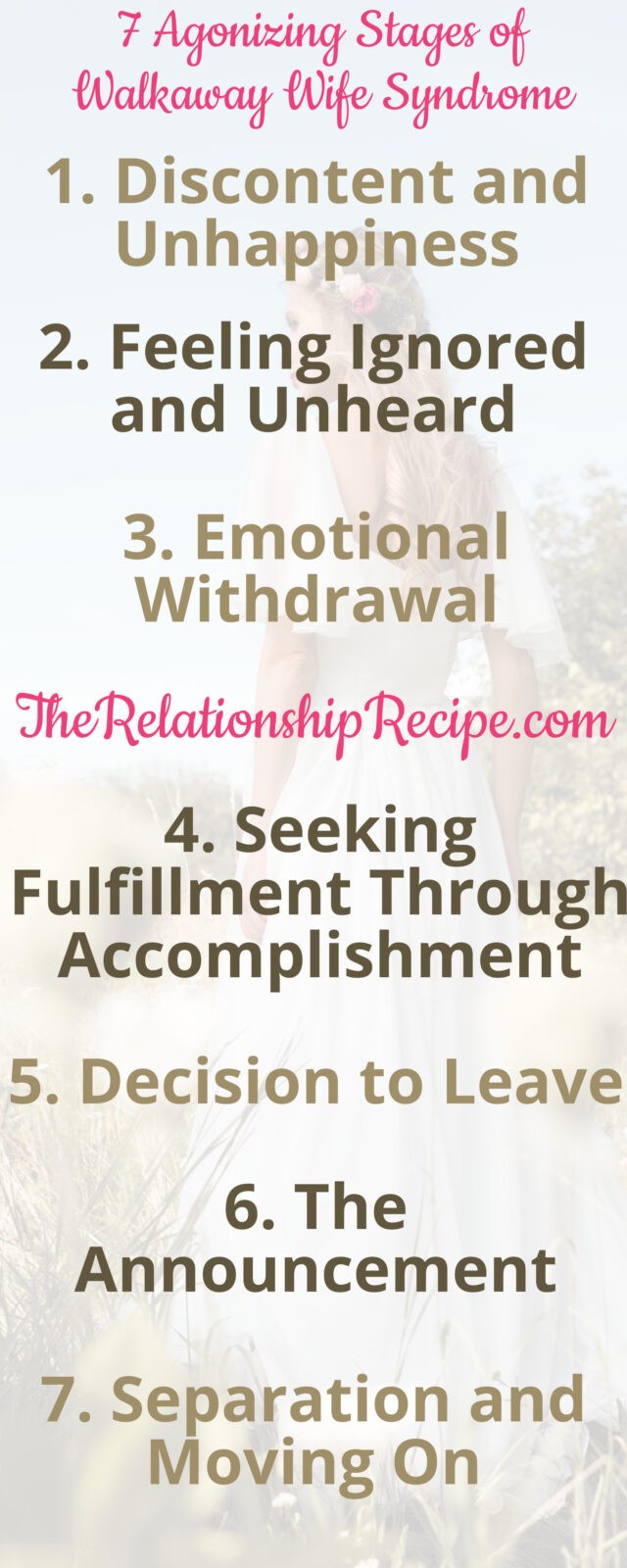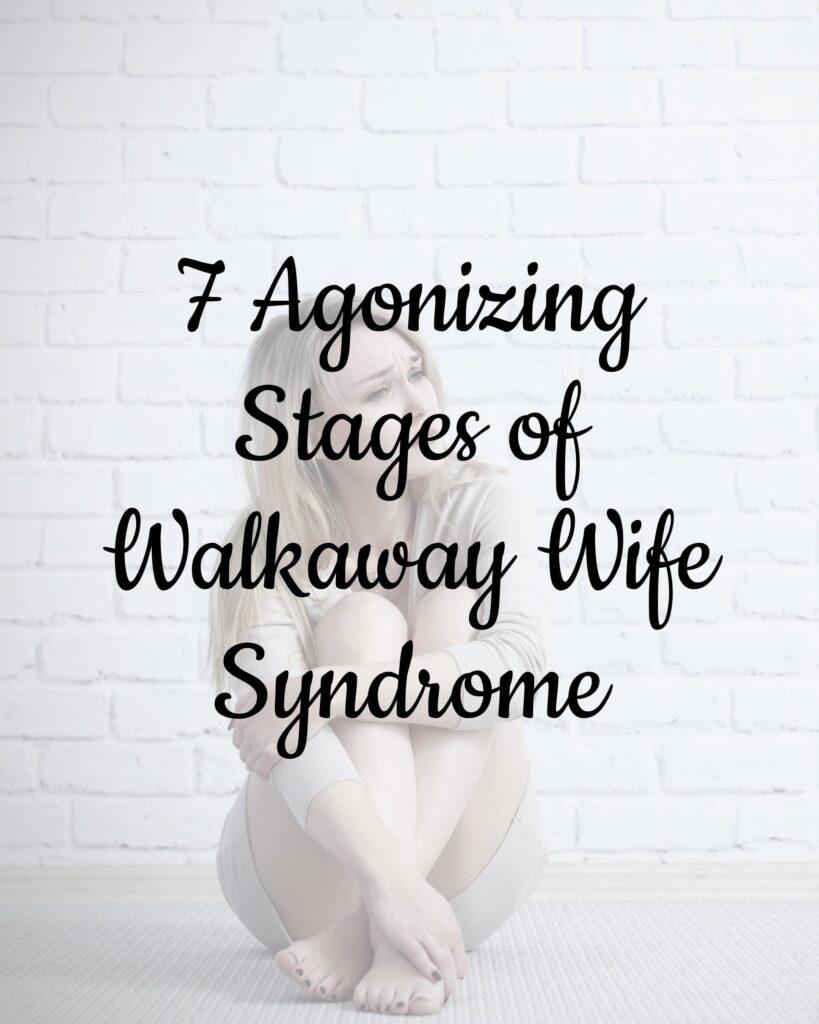Have you ever felt like you’re slowly fading out of your own marriage? Like you’re stuck in a loop of trying to keep things together but ending up more exhausted than fulfilled? That’s what the stages of walkaway wife syndrome look like; this quiet, painful process where a wife starts checking out long before she actually walks away.
It’s not some big dramatic fight or a flashy betrayal. It’s the slow burn of feeling unheard, unseen, and just plain tired of trying to hold everything together while you’re the only one bending. You might’ve done the “good wife” thing to the letter: putting your family first, keeping the peace, carrying the emotional load, and now you’re wondering how you got so worn out without even realizing it.
Back in the day, women stayed trapped in marriages because they had few choices. Men often left for younger women, but today’s walkaway wives aren’t walking away for someone else; we’re walking away for us.

💡Key Highlights:
- The subtle emotional shifts that quietly signal a woman is detaching
- Why being “fine” is often the beginning of the end
- How unmet needs turn into quiet exits
- What really happens before “I’m leaving” is ever said out loud
- The unseen strength behind walking away from what’s no longer working
Video for 7 Agonizing Stages of Walkaway Wife Syndrome
Stages of Walkaway Wife Syndrome
The stages of walkaway wife syndrome aren’t always a straight line. You might find yourself hovering between stages of the walkaway wife timeline, backtracking, or even skipping some altogether – and that’s totally normal. So if your journey feels messy or confusing, don’t beat yourself up over it.
Now, this isn’t some official psychological diagnosis, but it’s a pattern a lot of women recognize in their marriages. If you’ve felt stuck or distant, these stages might help put words to what’s been happening inside you.
So, here are the stages that usually show up along this emotional timeline:

🚩1. Discontent and Unhappiness
This is where it all usually starts, the first stage of walkaway wife syndrome. You begin to feel off, like something’s missing. You’re unhappy, but you’re not quite sure if it’s just a rough patch or something deeper. Your emotional needs aren’t being met, and that gnawing feeling starts to grow.
You try to talk about it. You bring up your concerns, hoping he will listen, understand, and maybe change something. But instead of hearing you, you get brushed off or your feelings ignored. That’s when the frustration kicks in. Feeling dismissed again and again chips away at your hope.
Slowly, you start pulling back emotionally, not because you want to, but because it feels safer. You might dive into hobbies, lean more on friends or family, or even daydream about a different life – one where you feel seen and valued. That sense of being all alone with these feelings makes you question if this marriage still has a future.

🚩2. Feeling Ignored and Unheard
This stage of walkaway wife syndrome is a tough one because it’s usually where things really start to fall apart. You keep trying to talk, to get through, but your spouse either dismisses what you say, ignores you, or brushes your feelings off like they don’t matter. This kind of disconnection hits hard and it’s not easy to bounce back from.
Every time you’re met with silence or indifference, that frustration grows. You start feeling more and more like you’re invisible in your own marriage. It’s not just that your needs aren’t met anymore; it’s like you don’t even exist as a person to your partner. That kind of emotional disconnection eats away at your self-esteem and leaves you questioning your worth.
After a while, you might stop trying altogether, shutting down emotionally because it feels pointless to keep investing in someone who won’t meet you halfway. This phase cements the painful realization that your spouse either can’t (or won’t) give you the support and care you need. And that’s when thoughts about walking away start to feel like the only option.

🚩3. Emotional Withdrawal
At this stage of walkaway wife syndrome, you start to emotionally withdraw from your marriage. You do this to protect yourself from getting hurt again and again. On your walkaway wife timeline, this emotional detachment becomes a survival tactic. You need to create distance so you don’t completely break down.
You stop trying as hard to fix things because it feels useless. Your efforts seem to fall on deaf ears, so you pull back even more. Your husband might even feel some relief that the constant tension has eased, but for you, this is a sign the relationship is slipping away.
As your emotional withdrawal deepens, intimacy between you and your spouse takes a hit. You lose interest in conversations, shared activities, and making future plans together. What started as a way to cope turns into a real barrier that keeps you from reconnecting. You might find yourself leaning on friends or new interests outside the marriage to fill the emptiness.
This stage of the walkaway wife syndrome marks a shift from trying to save your marriage to focusing on protecting your own heart. You might even start seriously thinking about what walking away would look like, and what it would take.

🚩4. Seeking Fulfillment Elsewhere
No, this doesn’t mean you’re looking for another man. What I’m talking about is where you start shifting your emotional energy outside your marriage. Maybe you dive into friendships, hobbies, or throw yourself into work. On a walkaway wife timeline, this stage often shows up as you searching for the connection and validation that’s missing at home.
You begin to spend more time reflecting on what you actually want: what your needs and desires are, not just what you’ve been trying to make work in your marriage. This self-reflection is huge because it helps you figure out what really makes you happy and fulfilled.
You might find yourself joining new groups, picking up long-forgotten interests, or getting deeply involved in projects that light you up. Those external connections start filling some of the emotional gaps that your marriage no longer meets.
This stage of walkaway wife syndrome is where personal growth really kicks in. You start to see clearly what’s missing and what’s non-negotiable for you moving forward. Maybe you even try therapy or counseling to get some extra support sorting through all this.
It’s a powerful stage because it often brings you face-to-face with the possibility that leaving might be the best way to find the fulfillment and happiness you deserve.

🚩5. Decision to Leave
When you reach this phase of walkaway wife syndrome, you’ve usually done a lot of soul-searching and asked yourself the tough questions. You realize you’ve tried everything you can to make the marriage work, and it just isn’t enough anymore. This is when you make the hard but clear decision: it’s time to leave.
Once that decision hits, you start getting practical. You might begin financial planning by opening your own bank accounts, saving money, or talking to a financial advisor to get your independence locked down. You also look into legal advice, so you know your rights and what to expect if you decide to file for divorce.
Maybe you start hunting for a new place to live or figure out the logistics of moving out. On your walkaway wife timeline, this stage is all about taking control and setting yourself up for the next chapter.
You’re not just dreaming about leaving anymore – you’re actively preparing for it. And with every step you take, you gain more confidence and clarity, knowing you’re finally prioritizing your emotional and mental well-being.

🚩6. The Announcement
This is the moment you have the hard talk with your spouse that you’re leaving. It’s usually a huge shock for them, especially if they had no idea how deep your unhappiness really ran. On the walkaway wife timeline, this stage is the hardest. It’s where a lot of us get stuck, right before taking that big leap.
Even when you know this is the right move, it feels terrifying. Whether you’ve been married three years or thirty, it’s like standing on the edge of a tall building, deciding if you’re going to jump or step back. It feels like a long, scary drop.
By the time you say those words, you’re usually firm in your decision. You’ve already grieved the marriage’s loss long before your spouse even knows it’s coming. For you, this is the start of moving forward, but for your partner, it’s often just the beginning of a tough emotional journey.
Breaking the news forces both of you to face the reality of a marriage that’s been slipping away. You’re ready for all the possible reactions, denial, anger, sadness, confusion, and you stand your ground knowing this step is part of your path to healing..

🚩7. Separation and Moving On
This is the stage where you actually leave – the physical and emotional separation happens here. You move out of the marital home and start building your own life on your terms. It’s both scary and empowering, a real turning point in your walkaway wife timeline.
Now, the real work begins: healing and rediscovering who you are outside of the marriage. This phase of walkaway wife syndrome is all about growth. You get to reconnect with your passions, set new boundaries, and find happiness that comes from putting yourself first.
It’s not always easy. There are tough days, doubts, and moments when you question everything, but this is your chance to move forward, stronger and clearer than before.

Final Thoughts on the Stages of Walkaway Wife Syndrome
This journey through each phase of walkaway wife syndrome looks different for everyone. You might not go through every stage exactly like this, and that’s totally okay. Even though we usually talk about “Walkaway Wife Syndrome” when it comes to women, men can go through these same feelings and stages too.
If any of this hits close to home, don’t hesitate to reach out for support, whether that’s friends, family, or a counselor. Having someone in your corner can make all the difference when you’re sorting through your emotions and figuring out your next steps.


This post may contain affiliate links. I earn from qualifying Amazon purchases at no extra cost to you.





